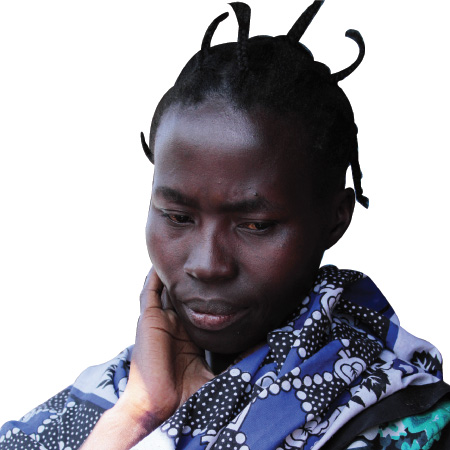 |
|
Mary Atieno’s husband committed suicide. He left a suicide note. [PHOTOS: BONIFACE MWANGI/STANDARD] |
By MERCY KAHENDA
NAKURU, KENYA: Mary Otieno, 34, is in deep grief. On January 9 her husband, David Oduor, 46, committed suicide in Kaptembwa slums, Nakuru.
The sudden death has compounded her problems. The mother of seven now bears the stigma associated with suicide. As if this is not worse enough, she does not have the funds to transport his body to his rural home in Siaya County for burial.
Mary’s family though is not the only one mourning as the number of suicide cases reported in Nakuru County continues to grow.
According to Nakuru police boss Bernard Kioko, these suicides are linked to family problems.
Mary says her husband was the sole breadwinner and decision maker and has no idea why he took his life
A note left by the deceased indicates he took his life because of marital problems.
But the widow says: “My husband never raised any issues concerning our marriage. I never heard him complain even once,” she says.
“If he had talked about it, we could have found a solution even if it meant separating,” she adds.
Helen Nekoye’s husband also killed himself.
Simon Wafula hanged himself at Murogi estate, Nakuru, after sending Hellen, 21, to the shop.
She, too, does not know the reason for this drastic decision. “We have been living peacefully and I do not why he decided to commit suicide before we could meet our expectations in life,” she says.
In Rongai, Mary Nandwa is also faced with the same predicament. Her husband died after drinking poison.
Mrs Nandwa says they had been struggling to raise the family and meeting basic needs like food was an uphill task.
“Before his demise, my husband had become withdrawn. I suspect this had to do with heavy responsibilities, which he felt he could not meet,” says the mother five.
Stay informed. Subscribe to our newsletter
“But I never suspected he would commit suicide because in families there are highs and lows.”
Just like the other women whose husbands have committed suicide, Mrs Nandwa and her children are now stigmatised.
“My neighbours shun us and even my children cannot play with their friends anymore,” says Mary.
Police records indicate suicide has been on the rise since in Nakuru 2011.
Twelve cases were reported in 2011 and 13 cases in 2012. 2013 led with 16 cases. Deaths caused due to family conflicts included 14 in 2011, 16 in 2012, while 2013 recorded a drop with 12 cases reported.
In Nairobi, a soccer fan, unable to cope with Manchester United’s loss committed suicide in December last year.
John Macharia, 28, jumped from his seventh floor house in Pipeline estate after Manchester United lost 1-0 to Newcastle United.
Macharia’s death was preceded by another involving an Arsenal fan, Suleiman Omondi, who hanged himself after the his team was beaten 3-1 by Manchester United in the second leg of Champions League semifinal game in 2009.
Police officers, too, have been on the news for killing themselves.
Dr James Mwaura, a psychologist and a lecturer, says suicide and other crimes, are caused by psychological problems.
“Committing suicide starts from the mind in that victims contemplate it before executing it. This may take a period of one year, two years or more,” says Dr Mwaura.
Psychological problems
Mwaura says there is a worrying trend of suicides due to lack of social support, too much society expectations, abandonment of African culture, economic constraints and marital issues such as infidelity.
“Under African culture, the family helped solve issues and even offered financial and moral support. Today, people are not concerned about their family members,” he says.
The psychologist also says an individualistic society that is slowly setting in is also to blame.
“Due to individualism, people spend most of their alone instead of talking to each other. Majority of individuals are not utilising social avenues like funerals, weddings, church services, community cultural, among others, to talk to other people,” he says.
The don says everyone can be a victim of psychological or mental illness that is why friends are important whenever we are faced with critical issues in life as they will encourage and support us spiritually, financially and morally.
He says people do not even know who their next door neighbours.
“The government is talking of Nyumba Kumi initiative but people do not know their neighbours. How do we expect to relate with those we are not conversant with?” he poses.
He says infidelity is a major cause of suicide among married couples.
“Our grandfathers would advice newlyweds when they begun living together. Nowadays, there is no one to give such advice and when couples encounter problems in marriage they grow out of proportion resulting in suicide in some cases,” he observes.
At the same time, he blames high society expectations, saying whenever people fail to achieve what they are expected, for instance, in career and marriage, they feel inferior and opt to die.
He says suicidal cases should be controlled by the society by sharing issues and observing each and every individual’s change in character, for instance, being withdrawn, change in eating habits, among others.
Though he says such characteristics are reversible, the main challenges in handling psychological problems is lack of competent therapists to handle mental problems, lack of well-equipped affordable rehabilitation centres to address psychological problems and seek long-term solutions.
“It is worrying as people are dying due to mental disturbances and there is no national body and properly equipped affordable rehabilitation centres,” he observes.
Mwaura calls on the government to establish a body to deal with psychological problems affecting individuals at workplace, institutions and family levels.
 The Standard Group Plc is a
multi-media organization with investments in media platforms spanning newspaper
print operations, television, radio broadcasting, digital and online services. The
Standard Group is recognized as a leading multi-media house in Kenya with a key
influence in matters of national and international interest.
The Standard Group Plc is a
multi-media organization with investments in media platforms spanning newspaper
print operations, television, radio broadcasting, digital and online services. The
Standard Group is recognized as a leading multi-media house in Kenya with a key
influence in matters of national and international interest.
 The Standard Group Plc is a
multi-media organization with investments in media platforms spanning newspaper
print operations, television, radio broadcasting, digital and online services. The
Standard Group is recognized as a leading multi-media house in Kenya with a key
influence in matters of national and international interest.
The Standard Group Plc is a
multi-media organization with investments in media platforms spanning newspaper
print operations, television, radio broadcasting, digital and online services. The
Standard Group is recognized as a leading multi-media house in Kenya with a key
influence in matters of national and international interest.










